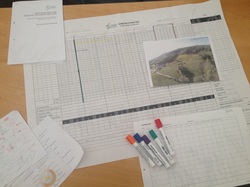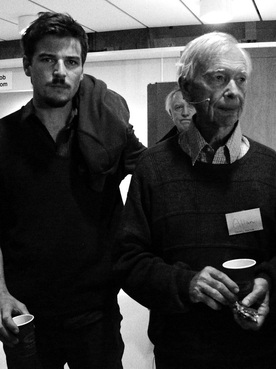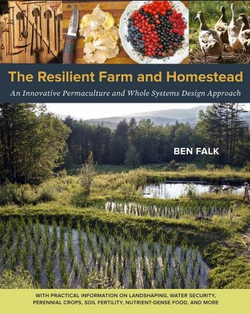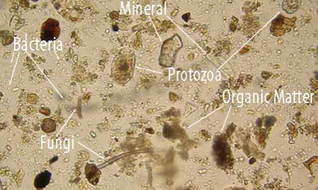 Kate, one of our awesome pioneering farm managers, has been conducting various research as we develop this farm project; both to help us make more informed management decisions in our grazing plan as well as allow us to demonstrate what impact our actions have on the land over time. So much in the Permaculture world seems based on circumstantial evidence; and in response we aim to design, implement, monitor and refine what we do based on measurable and replicable methods. Moving to a new land requires endless observation, recording, researching & monitoring the impact of our actions, so here's a glimpse into how we have begun doing that here at the farm. We have around 40 species in our very varied pasture, with large variances in soil. Whilst the research conducted so far is just the beginning, it has been incredibly beneficial in terms of really getting a good sense of what we are actually working with. Bravo Kate, we are so happy to have had you with us here for this incredible first season. It feels so important more folks in the alternative agriculture/ permaculture world start producing useful data for the benefit of all, thank you so much for the integrity & diligence you contribute.
2 Comments
 It's Day 2 of our certified Holistic Management training, dipping into the 2nd half of our awesome 10 Week Internship program. The Savory Institute has been updating, clarifying and simplifying their workbooks as smaller & more concise workbooks, available cheaply via their website. We have been running through Financial Planning and Grazing Planning today, using the farm as a model for planning for the factors, observations and circumstances we have in our situation, to ensure we create the best possible plan to move consistently towards our Holistic Context. We see managing holistically is key to forwarding effective regenerative enterprises and regenerating degraded landscapes whilst creating resilient & socially just incomes into the future. We plan to write some series of articles to clarify some of the common misconceptions and explain the process to support others to start managing holistically. Stay tuned for details.
We have another 10 Week Internship running at the farm July- Sept, with a few spots open, where once again we will be training up a diverse and engaging group in the following areas; The 10 Week internship includes over 530hrs of curriculum based learning & 5 Certificate Courses;
 Meeting with Allan Savory in Sweden Meeting with Allan Savory in Sweden Allan Savory's work observing & managing game reserves, ranches & national parks as a biologist is only part of what he describes led him to his breakthroughs fighting desertification (and the subsequent social & economic breakdown in some of the world's most hostile environments) through holistically planned grazing. His role as President of the opposition party against a racist government in Rhodesia (now Zimbabwe) eventually forced him to seek exile in the US where he observed desertification in National Parklands as bad as anything in Africa, yet with large herbivores having been absent for decades. As late as 1969 he was advocating culling large populations of wild animals such as elephants and hippos, when they were appearing to be destroying their habitat. He had participated in the culling of 40,000 elephants in the 1950s but he later concluded the culling did not reverse the degradation of the land, calling that project "the saddest and greatest blunder of my life" in his recent TED talk. Savory was inspired by earlier work of French agronomist André Voisin (some works available freely at the awesome resource http://www.soilandhealth.org/) who observed that cattle tended to return to the same patch of grass after about three days. Savory saw this as a solution of the riddle of time and that it was the length of time cattle were left in the same area and not just simple overgrazing which led to problems. Holistic planned grazing is now happening on every continent on over 15M Ha.  Ben Falk's book is a must for cold climate Permaculture designers, homesteader's and anyone keen to learn from insightful and experienced holistic decision making. We thoroughly enjoyed the read, and most importantly from our perspective; it's a work based on raw experience, dedication and enthusiasm. Permaculture design is learnt by doing; we need more practitioners out on the ground working professionally & implementing resilient and effective solutions restoring ecosystems, connecting people to bring about robust local economies & exchange systems and meeting our human needs holistically. This book supports those objectives, written in a refreshing tone that sets aside theory from observed practice. Ben has a diverse and deep design experience, and we are very excited to have him join us this spring for the first PDC at the farm as a guest lecturer via conference call. Getting a good Microscope for on farm monitoring of soil development View of soil organisms (image courtesy mauby.com) View of soil organisms (image courtesy mauby.com) Life in the soil is what drives fertility. As primary producers our responsibility is to feed, nourish and grow soil. At a training for farmers on the King & Queens home island in Stockholm we looked at several effective ways for farmers & land managers to engage in the monitoring of the impacts of their activities & decision making on soil health. Certain tools are really worth having. A good soil microscopy unit means we can monitor population changes of soil foodweb organisms, monitor compost processes and create compost teas that are simply teaming with beneficial support organisms to restore healthy populations back into the soil. Building healthy soil is our primary responsibility and the core solution to many agricultural problems. |
Details
Like us on FB Below for regular updatesStay up to date with customized updates you want to receive
Upcoming coursesArchives
December 2016
Categories
All
|

 RSS Feed
RSS Feed